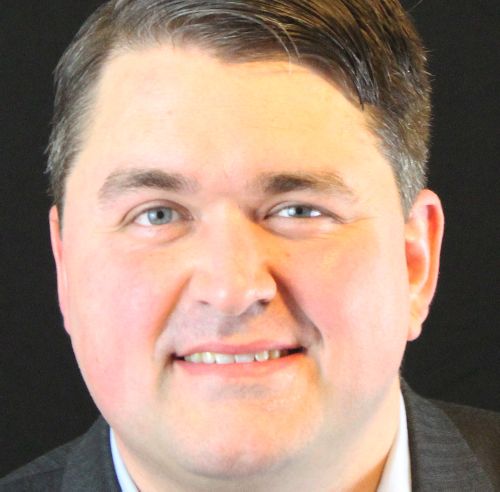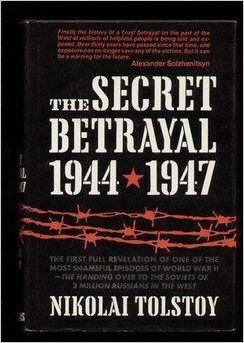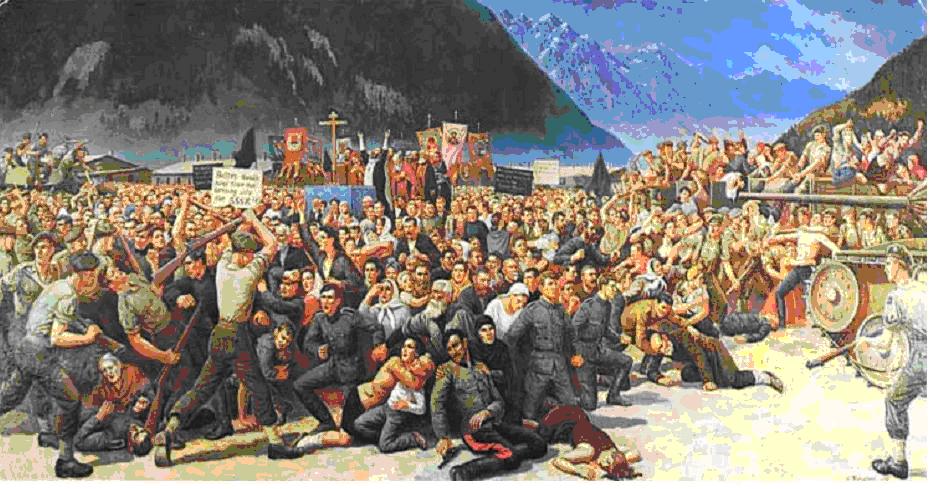A painting depicting the horrors of “Operation KeelHaul”
These Soviet Victims Will Never Get An American Apology But Should
At this moment of reflection upon the problems in the resolution to the Second World War, there are victims who are politically palatable, and others who are conveniently forgotten.

By Benjamin WetmoreJUNE 8, 2016
While President Obama hugged the survivors of Hiroshima on the quiet but assumed apology for President Truman’s decision to end the fighting against Japan by destroying two cities, other victims of that war who suffered more greatly have never been popularly acknowledged.
As German soldiers were being hung at Nuremberg for forced deportations of civilians to the concentration camp system, American soldiers were corralling up to 3 million Russian refugees of the 1917 Russian Revolution and sending them back to their certain death. This was known as “Operation Keelhaul,” and to the extent it’s referenced at all, it’s mentioned on obscure Web sites and a lonely Wikipedia page. Alexander Solzhenitsyn called this the “last secret” of the Second World War, and it has remained so due to the negligence of professional politicized academics who find fault with an American victory that obviously saved lives. What is odd is that subsequent Allied actions that saved no lives and cost the lives of many more go ignored and forgotten.
Some have characterized Obama’s action of expressing empathy as somehow shameful, and it certainly is not. But the selective memory, and the absence of appreciation for the suffering of millions of others who are not politically favorable, is revealing and actually shameful.
Sending People to Their Doom for No Good Reason
Obama went to Japan with a great deal of media speculation about an impending American apology for dropping atomic bombs in 1945 that ended the Second World War by forcing Japan to surrender two days after the second bomb fell on Nagasaki. These bombs, delivered by B29s, killed an estimated 129,000 civilians along with several thousand later from radiation poisoning and increased rates of cancer. The goal of the bombing was to end the war, to break a resolute and disciplined Japanese fighting spirit, to crack the militarists of their hold over the emperor.
Operation Keelhaul was the forced repatriation of millions of civilians after the end of conflict in Europe. These civilians were in Britain, France, and across Europe. When Czarist Russia fell into chaos, millions fled the impending bloodthirstyness of the Soviets. Vladimir Lenin believed in revolutionary terror to cement political control, taking lessons from the French Revolution. Many families, some elite, some merely middle class, fled with their families. They went to “safe” countries to restart their lives. Twenty-eight years later, to appease post-war Soviet demands for the return of “their” people, our occupation soldiers rounded up these families. Some of those returned were shot and massacred in front of Allied troops.
At Fort Dix in New Jersey, 154 were scheduled to be sent to the Soviet Union. A riot broke out when they were told their destination. Three committed suicide rather than return. In Europe, fathers were smothering their children then killing themselves rather than have them go back to the Soviet Union. Cossacks in Austria were disarmed, separated from their families, and shipped separately so they wouldn’t resist with force. Their entire families were returned, sent to their likely death.
These weren’t actions to hasten an end to the worst war in history, they were the vengeful actions of a dispassionate victor. These were not the Faustian choices of a state left with no good options, it was the country where the Statue of Liberty was within sight of huddled masses of people yearning to be free, yet committing suicide rather than be sent back to their deaths.
Politicizing War Reduces Our Honesty
The problem with politicizing war is that it takes away context. At the time, war is an exercise in propaganda and extreme patriotism. Afterwards, mired in our culture war, these incidents become props to score points; they are simplified for political actors to make simplistic points. Instead of the end of the war and an examination of mistakes and crimes committed, it’s seen as simply an empathetic left-wing president embracing victims, or to others an energetic left-wing president repudiating American victory. There’s never been a sober assessment of the American role in many needless deaths in World War II because the symbols involved are too vital to each ideology. The political theater of it all is seen, however, by the selective way in which these events happen, by who makes the cut for such empathetic displays, and which victims are forever sent down the memory hole never to be acknowledged or remembered.
It also deserves note that Obama, as a purveyor of modern liberal historical revisionism on these events, offers nothing more than an insincere apology. He offends nothing in his character to offer the apology. His fealty to those men and that cause is only as a historical antecedent from which he holds no special reverence. Obama, a political liberal, is merely cowing to a popular liberal belief. It brings nothing to the discussion because it’s entirely predictable.
When Richard Nixon, a noted anti-Communist who built his career on exposing alleged Communist spies, who railed against a State Department that acceded to the Chinese takeover of the islands of Quemoy and Matsu, embraced Mao, it represented a philosophical struggle. For Obama, his visit was merely political theater to further advance the ideology with which he already agrees. It requires no examination of conscience or a change in belief. It materially represents nothing other than offending American beliefs and values that he already implicitly detests.
The sacrifice and struggle of individual people during the Second World War is almost without comparison or parallel. The Right should not seek to rationalize the deaths at Hiroshima and Nagasaki: it was a necessary evil because there was no other way. Augmenting that empathy, though, the millions who suffered and died on the Eastern front in the war, subject to atrocities perpetrated by Germans and Russians as sometimes official policy, are forgotten crimes. Those memory lapses and willful ignorance can be excused by saying that Washington did not act in those situations, was not complicit in those crimes, even if Germany was supplied with capital and equipment from some American firms and the Soviets were often liquidating civilians in American Jeeps, planes built in Detroit, and tanks coming from American production lines.
When Will These Refugees Get Their Apology?
There is only one academic study of Operation Keelhaul by an American, published in 1975 by Stanford University’s Julius Epstein. The result of decades of study, the book chronicles and documents this crime and its motives. Two other books covering Keelhaul exist, both from the 1970s, Nicholas Bethell’s “The Last Secret” and Nikolai Tolstoy’s “The Secret Betrayal.” None have been reworked in light of the opening of the Soviet archives and the declassification of documents in the last 40 years.
One could ask the White House when these Russians—who were refugees, migrants looking to avoid the gulags and Communist executions, a totalitarian state that far exceeded the brutality of the Assad regime on its worst days—will get their apology.
Even more politically incorrect is noting the suffering of German troops after the war. Estimates vary, but according to some 3 million German POWs were taken by the Soviet Union, and according to later German government estimates nearly a million would die in custody. At the end of the war, preferring to surrender to the United States on the theory that their treatment would be much more humane, the Americans often refused to accept such German surrenders and forced them to the Soviets. In other instances, the American authorities simply transferred German POWs over to the Soviets as a “gesture of friendship.” The resulting brutality was unsurprising.
These were not war criminals, these were soldiers captured by an Allied country. Many were just young boys wearing the wrong uniform. They were worked to death in Siberia and ignored by the media. As the dehumanized, dispossessed remnants of an odious regime, they were seen to have deserved their fate because of collective guilt. Of the 90,000 men who surrendered at Stalingrad, less than 10 percent survived ten years in the gulags, most returning in 1954 after Stalin had died and Khrushchev lost the willpower to keep a concentration camp system operating.
An estimated 2-3 million civilians are simply missing from the conquered states in the East, who likely died at the hands of savage Soviet troops who were exhorted by Soviet propagandist Ilya Ehrenburg to kill and rape every civilian, a position so extreme that even Stalin remarked it was perhaps too far. Were these the inevitable civilian casualties of a policy of unconditional surrender that needlessly prolonged the war?
Stalin himself is said to have remarked that one death is a tragedy, and a million is a statistic. At this moment of reflection upon the problems in the resolution to the Second World War, there are victims who are politically palatable, and others who are conveniently forgotten. If Obama wanted to be a leader instead of an ideologue, he would remember the millions who died from direct American policy that had nothing to do with ending a war, and everything to do with official vindictiveness against civilian populations including the millions of Russians and Germans who died as a result of the unreasonable decisions of the American government.Benjamin Wetmore is an attorney.
source: Nikolai Tolstoy The secret Betrayal 1944- 1947

